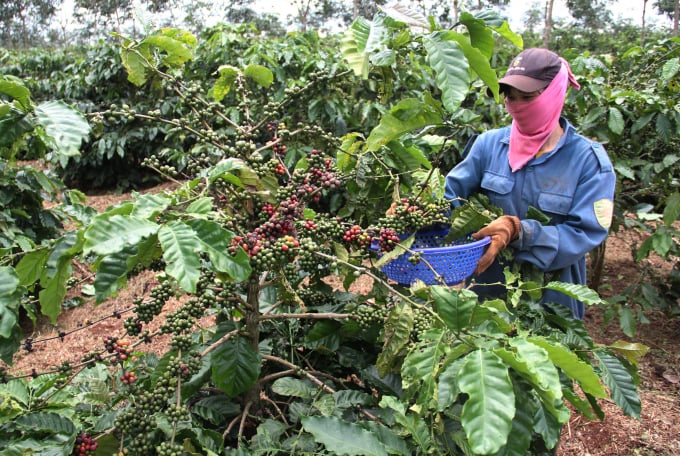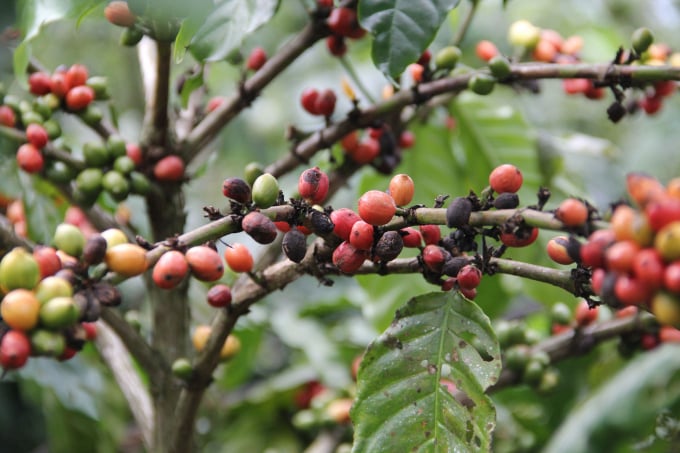November 23, 2025 | 06:48 GMT +7
November 23, 2025 | 06:48 GMT +7
Hotline: 0913.378.918
November 23, 2025 | 06:48 GMT +7
Hotline: 0913.378.918
Dak Lak starts the coffee harvest season, although because of the Covid-19 outbreak, the short-term personnel were unable to reach the region. Therefore, coffee pickers are in scarcity, the local government needs to design a strategy to enable farmers to harvest.
Chu Kpo Agricultural services Cooperative has around 239 ha of coffee, which enters the harvested crop in the following 20 days. However, the unit is anxious about the scarcity of coffee pickers.
“Currently, the cooperative has detected a deficit of 50 percent of the employees to gather coffee. Therefore, the unit is preparing a report to the local government to find a solution to both guarantee that the coffee is ready where it can be picked and also assure the prevention of the epidemic," said Mr. Phan Trong Ky, director of the cooperative.
Krong Kuk district boasts a big coffee area in the province with over 20,600 ha however due to the difficulty of the virus, farmers are battling with coffee harvesting.
Mr. Phan Hoang Lam, Vice Chairman of Krong Buk District People's Committee, indicated that the local labor force participating in gathering coffee in the region barely meets approximately 75-80 percent. For the remainder, the area requires roughly 20-25 percent of the workforce from outside the province. Currently, because of the effect of the Covid-19 pandemic, laborers from outside the province do not come to the region.

Dak Lak develops a plan to help people collect coffee. Photo: Quang Yen.
According to Mr. Lam, throughout the last period, the number of individuals from the southern provinces to the neighborhood has been high, but largely women. Therefore, this number only covers a part of the local need for coffee harvesting employees.
The coffee can't be left ripen before the harvest thus the area has put up a working group to support people.
The Vice-Chairman stated that the district is requesting communes to analyze exactly the area and output so that the working committee can make specific strategies to assist people to harvest and select coffee most efficiently.
According to Dak Lak Department of Agriculture and Rural Development’s data, the area has more than 200.000 hectares of coffee with an output of almost 500,000 tons. However, because to the effect of the Covid-19 pandemic, the province requested departments and towns to implement measures to assist people to gather coffee.

Many areas of coffee have reached the time of harvest but the pickers are insufficient. Photo: Quang Yen.
The People's Committee of Dak Lak province instructed the districts to proactively establish a strategy to deploy human resources to gather coffee in line with probable epidemic trends.
In particular, communities need to pay attention to level 3 (high-risk regions) and level 4 (extremely high-risk areas), since not only coffee harvesting but also the operation of production and harvest of other agricultural goods would also be challenging.
“Localities need to examine and optimize local human resources. In case of necessity, the People's Committees of the districts will work directly with the local military authorities to consider mobilizing the armed forces to participate in collecting coffee", the People's Committee of Dak Lak province requested.
In addition, the People's Committee of Dak Lak province remarked that now the source of labor from the southern provinces returning to the province is rather significant, communities need to have a strategy to mobilize and employ this human resource but must guarantee pandemic preventive measures.
The People's Committee of Dak Lak province also assigned the provincial Department of Agriculture and Rural Development to assume the prime responsibility for, and coordinate with other departments and sectors in updating information, organizing and guiding the districts, towns and cities to develop a plan to mobilize human resources to collect coffee in accordance with the epidemic situation, ensuring the principles and requirements of Covid-19 epidemic prevention and control.
Localities in the midst of formulating strategies to mobilize human resources to gather coffee, actively contact the Department of Agriculture and Rural Development for advice.
Translated by Linh Linh

(VAN) Viet Nam’s forestry sector is undergoing a comprehensive transformation, strengthening management, protection, and development efforts to maintain ecological security and drive green, sustainable growth.

(VAN) Viet Nam is accelerating efforts to digitize reservoir operations, from real-time data to hydraulic modelling.
/2025/11/21/3348-2-102623_454.jpg)
(VAN) National Assembly delegate Nguyen Thi Lan has proposed adding special mechanisms to attract human resources to the agricultural, forestry, and fishery sectors, addressing the shortage of high-quality personnel.

(VAN) Over the past two decades, the unified legal framework for water resource management has been perfected, becoming a crucial foundation for ensuring national water security.

(VAN) The land-data cleansing campaign in Dien Bien is entering its final stretch, yet weak infrastructure, limited personnel and fragmented multi-period datasets continue to create major obstacles.
/2025/11/20/0204-2-115235_496.jpg)
(VAN) Not only do carbon credits bring a great revenue source, but they also contribute to better forest protection and development. However, this potential remains largely untapped.

(VAN) Applying modern technology is helping environmental monitoring and oversight of management quality.